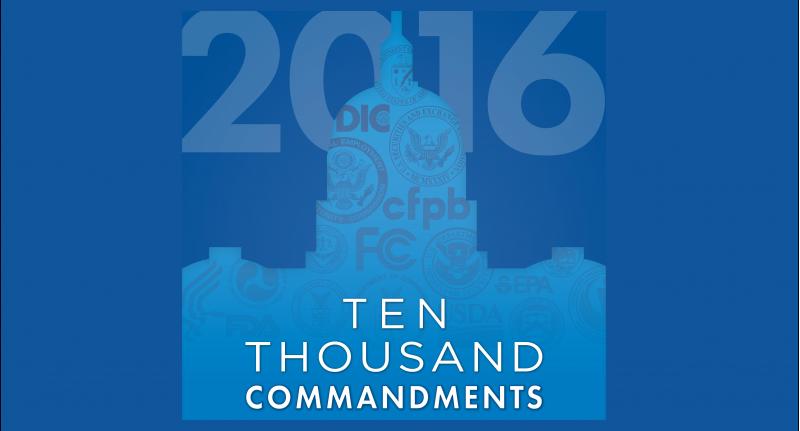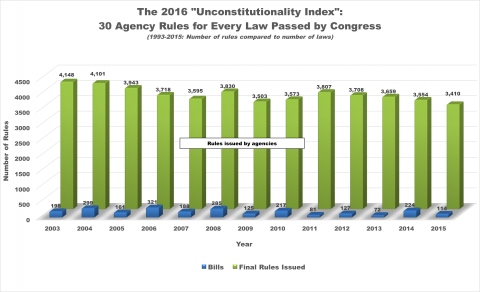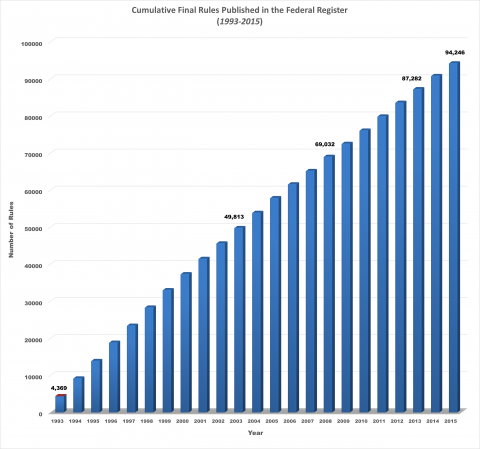Regulations under President Obama, who is working hard to issue more expensive rules than any other American president, cost taxpayers and the economy $1.9 trillion a year, a $14,842 hidden tax on every household, according to a shocking new report on government red tape.
The annual “Ten Thousand Commandments” report from the Competitive Enterprise Institute said that there were 30 new rules issued for every single law passed last year.

“If it were a country, U.S. regulation would be the ninth-largest economy, ranked behind India and ahead of Russia,” wrote Clyde Wayne Crews Jr., vice president for policy. He said the total bill is higher than Canada’s gross domestic product.
His annual report shines a light on the burden of red tape, regulations and rules, and uses real numbers to show the impact on business and ordinary Americans, a growing crisis that GOP presidential candidate Donald Trump has begun to focus on.

The report finds that the cost of regulations are three times the national deficit. And it notes that businesses generally pass on the costs to consumers.
“Firms generally pass the costs of some taxes along to consumers. Likewise, some regulatory compliance costs borne by businesses will find their way into the prices consumers pay, affect the wages workers earn, and lead to lower levels of growth and prosperity,” wrote Crews.
He found that Obama is a much more aggressive regulation writer than former President George W. Bush. Bush averaged 62 “major regulations” annually, compared to 81 for Obama.

One only needs to look at the 2015 federal register, which contained 80,260 pages, the third biggest in history. Of the seven all time highest Federal Register total page count, six occurred under Obama.
Among the highlights in the report seen here:
— Based on federal government data, past reports, and contemporary studies, this report highlights regulatory compliance and economic impacts of federal intervention of $1.885 trillion annually.
— The Weidenbaum Center at Washington University in St. Louis and the Regulatory Studies Center at George Washington University in Washington, D.C., jointly estimate that agencies spent $63 billion in 2015 to administer and police the regulatory enterprise. Adding the $1.885 trillion in off-budget compliance costs brings the total reckoned regulatory enterprise to about $1.948 trillion.
— If it were a country, U.S. regulation would be the ninth-largest economy, ranking behind India and ahead of Russia.
— U.S. regulatory costs fall between the gross domestic products (GDPs) of Canada and the United Kingdom, the highest-income nations among the countries ranked most free in the annual Index of Economic Freedom and Economic Freedom of the World reports.
— If one assumed that all costs of federal regulation and intervention flowed all the way down to households, U.S. households would “pay” $14,842 annually on average in a regulatory hidden tax. That payment amounts to 22 percent of the average income of $66,877 and 28 percent of the expenditure budget of $53,495. The “tax” exceeds every item in the budget except housing. More is “spent” on embedded regulation than on health care, food, transportation, entertainment, apparel, services, and savings.
— Regulatory costs of $1.88 trillion amount to 11 percent of U.S. GDP, which was estimated at $17.9 trillion in 2015 by the Commerce Department’s Bureau of Economic Analysis.
— Regulatory costs rival corporate pretax profits of $2.208 trillion.
— As for the current regulatory pipeline, 60 federal departments, agencies, and commissions have 3,297 regulatory actions at various stages of implementation, according to the fall 2015 “Regulatory Plan and the Unified Agenda of Federal Regulatory and Deregulatory Actions.”
— Of the 3,297 regulations in the pipeline, 218 are “economically significant” rules, which the federal government defines as having annual effects on the economy of $100 million or more. Assuming that those rulemaking effects are primarily regulatory rather than deregulatory implies roughly $22 billion yearly in future off-budget regulatory costs in the works.
Paul Bedard, the Washington Examiner’s “Washington Secrets” columnist, can be contacted at [email protected]

